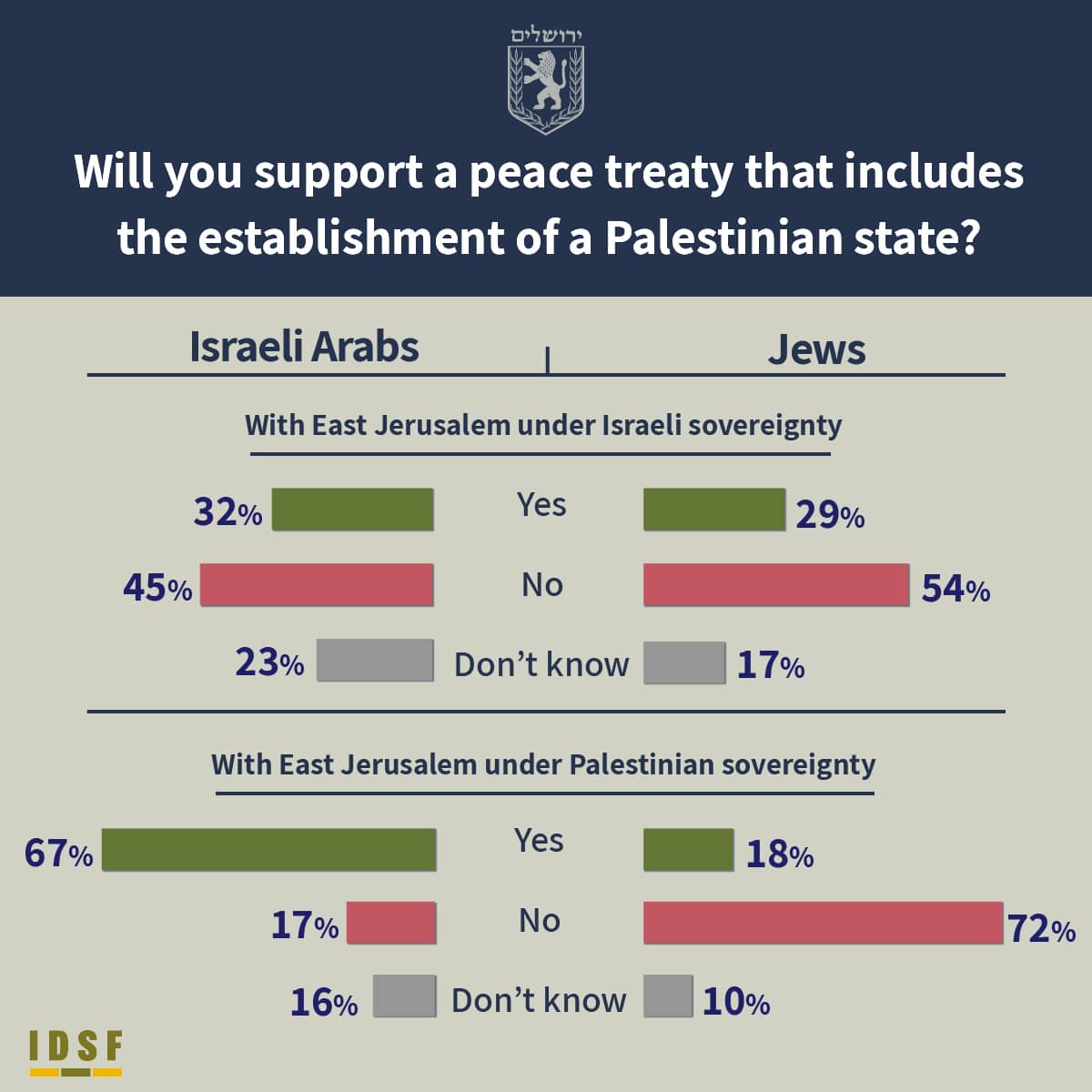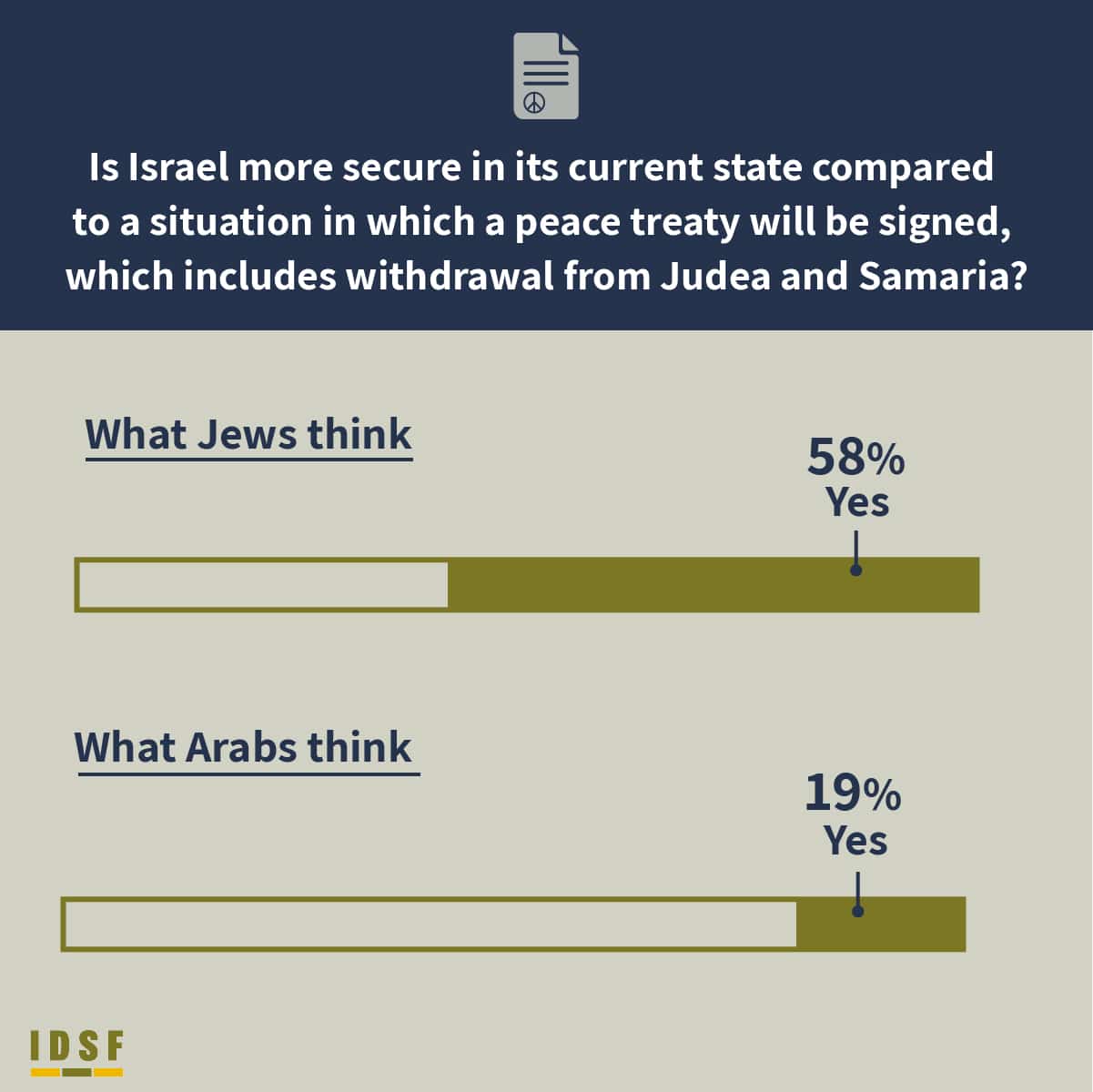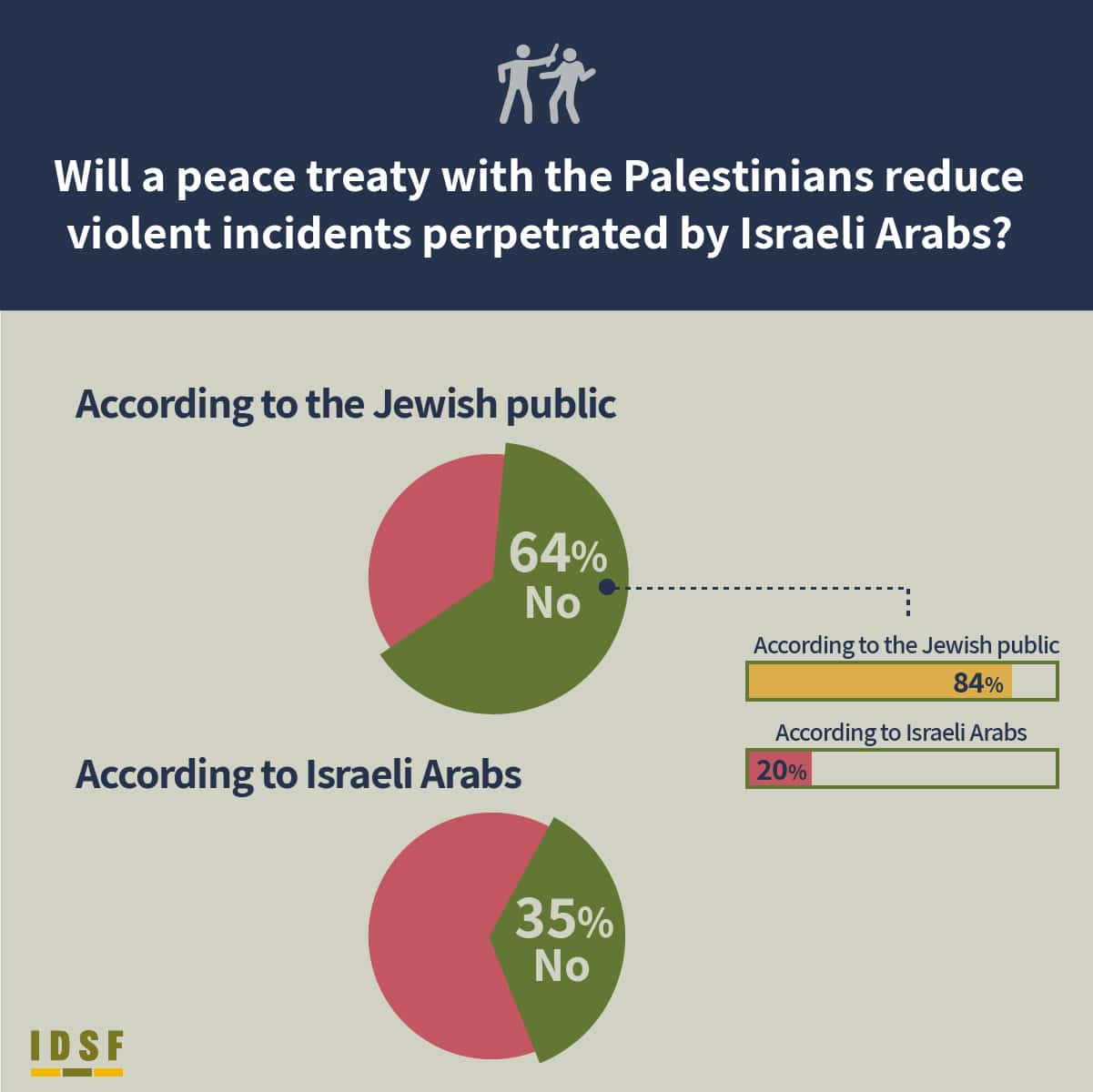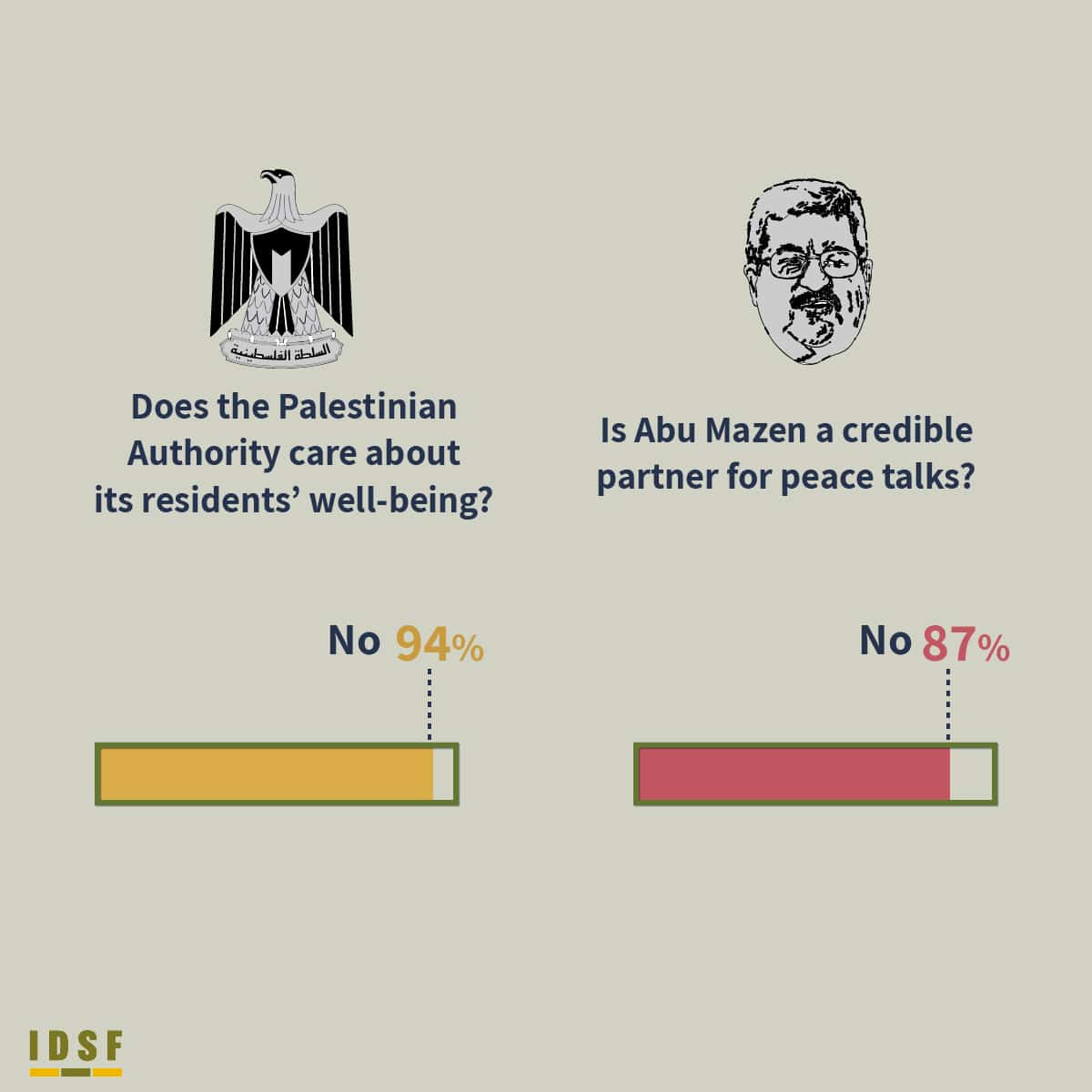Throughout our country’s short history, the debate over peace treaties with the Palestinians, their cost and anticipated effectiveness, has defined political blocs and has even produced deep schisms in Israeli society. Our Research Department has this time decided to review the attitudes within Israeli society regarding peace treaties with the Palestinians, the status of Jerusalem in such treaties, and to examine whether a partner for peace even exists.
The IDSF Index survey was conducted by the Research Department with statistical support from Dr. Hagay Elkayam. 1,059 respondents were sampled – adult (over 18 years of age) Internet users in Israel, and has been reviewed to ensure fair representation in terms of age, gender, nationality, religion, and political affiliation. For the integrated sample (1,059 respondents) the maximum sampling margin of error is ±3.01% with a 95% probability. For the Jewish sample (802 respondents) the maximum sampling margin of error is ±3.46% with a 95% probability. For the Arabic survey (258 respondents) the maximum sampling margin of error is ±6.1% with a probability of 95%.
The Bone of Contention: Jerusalem
A claim often heard regarding the Israel-Palestine conflict is that the only way to put an end to the conflict is the two-state solution. This is why we began our survey by drilling down into this claim. We divided the questions into two parts: inquiry into attitudes within the Israeli public regarding a Palestinian state with its capital in Jerusalem, and inquiry into their attitudes regarding a Palestinian state where Jerusalem remains under Israeli sovereignty.
In order to fine-tune the question and eliminate any bias, we worded the question as follows: “Would you support a peace agreement with the Palestinians, backed by security arrangements, which includes the establishment of a Palestinian state on the majority of the Judea and Samaria territories, with Jerusalem as its capital? 60% of the Israeli public object to such an agreement, 28% are in favor (12% responded “Don’t know”).
When segmented by nationality, the differences come into clearer relief: among the Jews, 72% object to such an agreement and 17% are in favor, as opposed to 67% of the Arabs being in favor of such an agreement and 17% who oppose it (the rest responded “Don’t know”). Ideologically segmented, 92% of the respondents that identify with the right oppose such an agreement while only 2% are in favor, while 60% of the left supports such an agreement and 25% oppose it (the rest responded “Don’t know”).
Next, we asked the exact same question, with only the ending being changed: “Would you support a peace agreement with the Palestinians, backed by security arrangements, which includes the establishment of a Palestinian state on the majority of the Judea and Samaria territories, with East Jerusalem remaining under Israeli sovereignty”?
The data shows that 52% of the Israeli public object to such an agreement, while 30% are in favor (the rest responded “Don’t know”). When segmented by nationality, The data shows that 54% of the Israeli public object to such an agreement, while 29% are in favor. Among the Arabs, on the other hand, 45% object to such an agreement and 32% are in favor (the rest responded “Don’t know”). Ideologically segmented, while 76% of the right object to such an agreement and 12% are in favor, 16% of the left oppose such an agreement and 63% are in favor.
The first insight from the data is that among the Israeli public, there is no support for the two-state solution. such a solution is not supported where Jerusalem remains under Israeli sovereignty, and all the more so does the Israeli public object to an agreement in which Jerusalem comes under the sovereignty of a Palestinian state.
Another insight is that when approaching the two-state solution, it is important to understand that Jerusalem is the main stumbling block. There is no way – as the data shows – to “leave Jerusalem for the final phase of the talks”, as the two-state solution supporters sometimes claim.
However perhaps the most significant insight is, that even when Israeli Arabs were asked about a settlement that includes handing Jerusalem over to Palestinian rule, only 67% came out in favor. In other words, even in an agreement in which the Jewish population is theoretically prepared to accede to all of the Palestinians’ demands, one third of Israel’s Arabs have reservations regarding this solution.
Managing the conflict: A change in the situation will only make things worse
Ruling out a solution is easier than suggesting a new one. But perhaps the current situation is preferable to a new solution? We asked the Israeli public whether Israel is more secure in its current state compared with a situation in which a peace agreement is signed with the Palestinians, which includes withdrawal from Judea and Samaria.
Only 34% of the Israeli population believe Israel will be more secure if a peace agreement would be signed to include withdrawal from Judea and Samaria, as opposed to 49% who believe Israel is more secure in its current state (the rest responded “Don’t know”).
Segmentation by nationality shows that among the Jews, 58% believe Israel is more secure in its current state, as opposed to 19% among Arabs that think so. In other words, the majority of Jews prefer to continue with what is termed “conflict management”.
When segmented ideologically, there were no surprises. 84% of all right-wing respondents prefer to keep the current situation while only 7% believe Israel would be more secure if a peace treaty were signed, which includes withdrawal from Judea and Samaria. Among the left-wing respondents, the data shows an almost perfect mirror picture: 82% favor an agreement that includes withdrawal from Judea and Samaria while 7% are in favor of maintaining the current situation (the rest responded “Don’t know”).
If a peace treaty is signed – will there be peace?
The May 2021 riots have left a profound impression on Israeli public opinion: the concept of coexistence got undermined even among the diehard optimists. A widespread string of violent attacks, perhaps even unprecedented, on the part of a large proportion of Israel’s Arabs, overwhelmed the streets in Israel’s mixed cities, catching the police unprepared for such severe public disorder.
In the next part of the survey we examined whether a peace treaty might have an effect on riots of the kind we witnessed in May 2021. 57% of the Israeli public believe a peace treaty with the Palestinians will not prevent or reduce incidents of violence on the part of Israel’s Arabs. Among the Jews, 64% agree with this statement and among the Arabs, 35% agree.
When segmented ideologically, 84% of the right wing believe a peace treaty with the Palestinians will not prevent or reduce incidents of violence among Israel’s Arabs, compared with only 20% on the left that believe so. This data indicates a conceptual divergence of opinion between the way those identified with the left wing perceive the Israeli Arabs, and the way the Israeli Arabs portray reality: while only 20% of left-wingers believe a peace treaty with the Palestinians is not going to prevent or reduce the incidence of violence among Israel’s Arabs, 35% of Israel’s Arabs believe violent incidents will not be prevented or reduced following a peace treaty.
In other words, even if a peace treaty will be signed, more than one out of three Israeli Arabs doubt this will dampen violent outbursts of the kind we witnessed in May 2021. This reinforces the belief that solving the 1967 conflict will not solve the 1948 conflict.
Yes partner, no partner: and what will happen after a peace treaty has been signed?
The person in charge of the Palestinian Authority at the moment is Abu Mazen. Therefore any effort to work toward a peace treaty with the Palestinian Authority means negotiating with him. We asked the Israeli public whether Abu Mazen is a credible partner for peace talks with the Palestinians. The results were literally astounding: only 10% of all Jews and 24% of all Arabs in Israel believe that Abu Mazen is a credible partner. And what about the moral and ethical aspects of an agreement with the Palestinian Authority? We asked the Israeli public whether the Palestinian Authority takes care of the well-being of its residents. The data shows that only 11% of Israeli Arabs and 4% of the Jewish population believe the Palestinian Authority takes care of its residents’ well-being. In other words, an agreement with the Palestinian Authority is not going to mean an improvement of its residents’ well-being.
Moreover, even if a peace treaty will be signed with the Palestinian Authority, its viability is in doubt, since Palestinian Authority residents do not feel the Authority is looking out for their well-being, therefore the Authority’s stability is in doubt. To read more about the Palestinian Authority’s stability, look here.
There are two conclusions one can draw from these data: One is that Israeli public opinion, both Jewish and Arab, is globally convinced that currently there is no partner; the second is that even if there was a partner, the stability of such an agreement, not to mention its moral validity – would be highly dubious.
Brigadier-general (Res.) Amir Avivi: “The majority of public opinion is opposed to a Palestinian State in Judea and Samaria”
“The two-state solution has become the dominant pattern of thinking. It precludes the possibility of any other solutions”, says the Movement’s Founder-Chairman, Brigadier-General (Res.) Amir Avivi, “so first of all – other solutions do exist. Secondly, the index shows that in any case, the majority opposes such a solution. The public is no fool – the public is aware that establishing a Palestinian state in Judea and Samaria means a de-facto Gaza reincarnate on steroids right in the country’s heartland”.
“Besides that, the index unequivocally shows there is no partner”, Avivi adds. “Abu Mazen is perceived as unreliable – to Israeli Arabs and certainly among the Jewish population. The Palestinian Authority is perceived – categorically and across all sectors – as one that neglects its residents’ well-being. Let those that seek to make peace with the Palestinian Authority from a position of enlightenment and for the sake of human rights ask themselves whether this is how we will assure the well-being of the Authority’s residents”.










